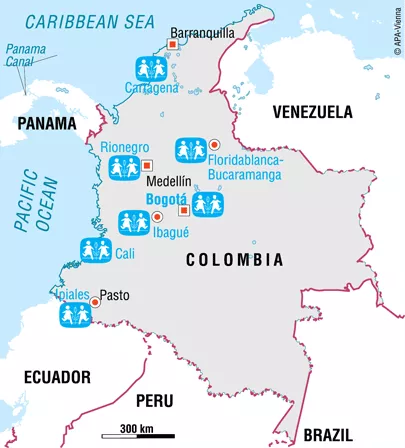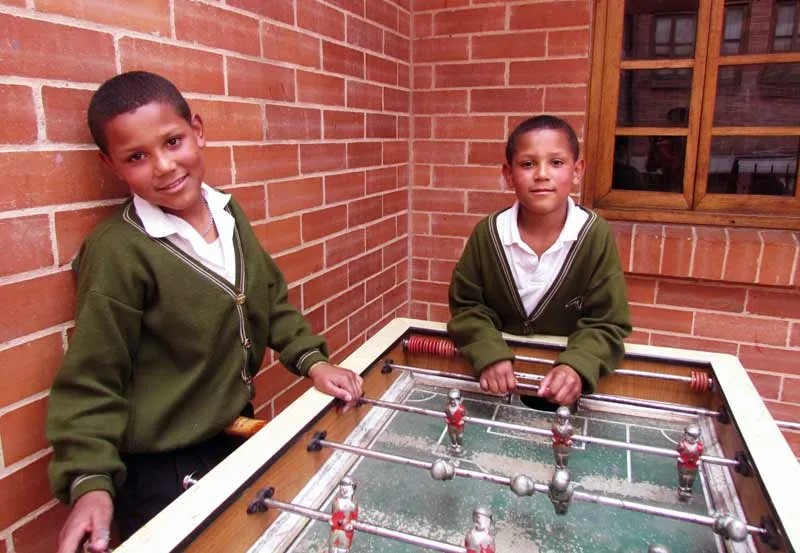
SOS relies on the kindness and generosity of Canadians to be able to provide a home for the most vulnerable children around the world.
By becoming a child sponsor you are helping an individual child in need.
(You will receive a Canadian charitable tax receipt)
Please help us ensure a loving home for every child. Sponsor a child in South America now.
SOS Children's Villages in Bogotá
The city of Bogotá has seen vast improvements in terms of security, infrastructure and poverty reduction over recent years. Nonetheless, in the poorer parts of Colombia's capital, tens of thousands find themselves on the bottom rungs of the socioeconomic ladder. In the city's numerous shantytowns, there are still bogotanos who do not have access to decent housing, medical services and electricity.
In 1971, SOS Children's Villages started working with children and young people in Bogotá. Our organisation has been offering an integral package of services to the population in need. This package includes family strengthening programmes, loving homes for children who grow up without parental support, a programme for young people and medical attention.

SOS Children's Village Bogotá now consists of 19 SOS families where up to 171 children are cared for by loving SOS mothers. Family strengthening is offered through the SOS Social Centre, aiming to strengthen existing family ties so that children can grow up in their own loving family. Mothers are being given the opportunity to leave their children in our day-care centre so that they can go to work. Furthermore, the SOS Social Centres offer medical attention, advice on family planning and sexual education.
With the help of qualified staff, young people develop perspectives for their future and learn to shoulder responsibility as they lead semi-independent lives at the special accommodation we provide for them. They are encouraged to develop a sense of team spirit and build contacts with relatives and friends as well as with possible employers.
A city marked by social inequality
Bogotá is the capital and largest city of Colombia. It is also one of the biggest cities in Latin America, both in terms of population and land area.
Demographically speaking, Bogotá is a fairly young city, with around 31 per cent of its population being less than 18 years of age.
Although Bogotá has seen significant improvements concerning security, infrastructure and poverty reduction over the last decade, tens of thousands of families in this modern metropolis are still affected by unemployment, poverty and a lack of access to public services.
Social inequality is fairly high in Colombia's capital: around 40 per cent of the total income is controlled by only seven per cent of the city's population. Although the city's under-five-mortality rate has dropped noticeably over the last twenty years, it is still higher than in Latin America's most developed cities such as Santiago de Chile and San José, Costa Rica.
Whether children grow up with or without parental care significantly affects their educational career. Children who grow up without parental care are less likely to attend school. In Colombia, school absenteeism is up at 27 per cent among children who grow up without parental support.
Children who for various reasons end up living without parental care and support are usually exposed to poverty, discrimination and exclusion, factors which in turn increase their risk of suffering abuse and exploitation. As a result of poverty and parental neglect, around 2,000 children in Bogotá live on the streets. Deprecatingly referred to as "gamines", most of them sleep in parks, on the sidewalk or in homeless shelters. Most of them eke out a living by selling merchandise, washing cars or engaging in petty theft. Glue sniffing and other forms of drug abuse mark their lives.
Instead of attending school, many children are involved in labour activities
Around 87,000 children in Colombia's capital engage in labour activities at a very early age. Most of them are involved in the informal sector. 26 per cent of these children do not attend school. The link between child labour and poverty is undeniably strong in Bogotá. In most cases, parents depend on the extra income generated by their children and thus take their children out of school.
Without a decent education, a child from a poor family background has little chance to break the cycle of poverty. According to the Economic Commission for Latin America (CEPAL), the income generated by an adult is 20 per cent less with every year of education that this person missed out on during his or her childhood and youth. Through our SOS Family Strengthening Programmes and SOS Social Centres we do everything we can to avoid family breakups and reduce the risk of a child ending up on the street.

Our Impact
Image

SOS Social Centres in Colombia aim is to help families, in particular women and children, living in communities neighbouring the SOS Children's Villages to gradually escape from poverty, and to help young people become self-reliant. |
4 SOCIAL CENTRES | 1777 Beneficiaries |
Image
The SOS Children's Village in Colombia provides loving homes to orphaned and abandoned children |
1 VILLAGES | 120 Orphaned and Abandoned Children |
Image
The SOS Youth Facilities in Colombia provides youth with a loving environment where they learn to transition into independent living and to expand their education |
2 YOUTH FACILITIES | 90 Youths in our Care |
Our Impact

